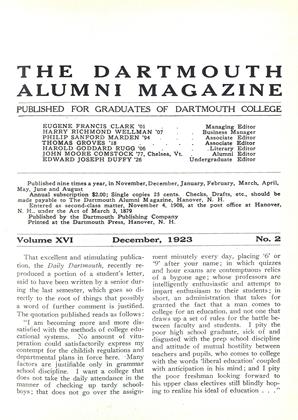"The summer baseball question continues to bother the Dartmouth Athletic Council," according to the annual report submitted to the Dartmouth faculty by Professor James P. Richardson, chairman of the faculty committee on athletics. "The undergraduates cannot be convinced that there is anything about playing baseball for money in the summer which should be considered objectionable.
"Moreover, they object, and with some reason, to the pretty strict enforcement of the rules which we attempt, when many other colleges are much more lenient. In the judgment of the committee either the rule against summer baseball must be abolished or else it must be enforced, on a uniform intercollegiate basis, or as a third alternative, intercollegiate baseball should be abandoned."
Thanks to the football games with Harvard at Cambridge and with Cornell at New York, the college year 1922-23 was financially one of the best in the history of athletics at Dartmouth, according to the report. The previous year, 1921-22, was reported as the worst financial year, a deficit of $35,000 using up all the council's reserve funds. Last year the operations of the council left a net profit of nearly $21,000, total receipts being $149,220.57, and total expenses $128,306.93. The receipts from football were $98,407.06, almost exactly twothirds of the total receipts. The expenses of football were $41,273.98, less than one-third of the total expense.
The net profit shown by football was $57,133.08. Not a single other sport showed a balance on the right side, the deficits ranging from $19.26 for the rifle team to $9147.52 for the track team, which is always the heaviest loser. If to varsity track were to be added the expense of the freshman track department and the cross-country teams, the total deficit of the track department would be $11,923.51. Basketball lost $6398.89; baseball $2765.41; hockey $1896.27; swimming $1199.84, and golf $892.26.
Commenting on the financial portion of the committee's report, Professor Richardson said, "Unless we are prepared to recast our entire athletic program to such a revolutionary extent as virtually to mean the abolition of intercollegiate competition in all other branches of sport, we are bound to construct our football schedules so that the money necessary to pay the bills will be forthcoming."
Scholarship in relation to athletics was a major concern of the committee as shown in many statements of Professor Richardson's report. In regard to the "week-ending" out of-town of students during the football season, the committee recommended that the faculty have an understanding that men are to be encouraged to go annually to but one football game outside of Hanover, and that the same standard of scholastic work be staunchly and unitedly insisted upon for Saturdays and Mondays as for other days of the week.
Both baseball and basketball schedules last year were shortened as respects games away from home in term time, in response to the expressed wish of the faculty. The basketball team now plays practically no games away from Hanover except those with, the five other members of the Eastern Intercollegiate League.
The committee expressed satisfaction in the fact that according to the mid-semester marks published last fall just at the end of the football season not a single member of the entire Dartmouth football squad would have been ineligible to continue in football practice. Mention was also made of the four captains of major sport teams-C. G. Aschenbach, A. N. Thurston, K. Friedman and K.P. Libbey, whose combined scholastic average is higher than that required for election to Phi Beta Kappa.
 View Full Issue
View Full Issue
More From This Issue
-
 Sports
SportsFOOTBALL
December 1923 -
 Article
ArticleThat excellent and stimulating publication, the Daily Dartmouth,
December 1923 -
 Class Notes
Class NotesCLASS OF 1903
December 1923 By Perley E. Whelden -
 Class Notes
Class NotesCLASS OF 1903
December 1923 By Perley E. Whelden -
 Article
ArticleALUMNI COUNCIL MEETS IN BOSTON
December 1923 -
 Class Notes
Class NotesCLASS OF 1911
December 1923 By Nathaniel G. Burleigh








